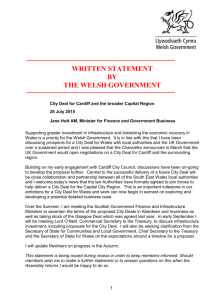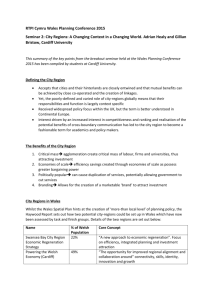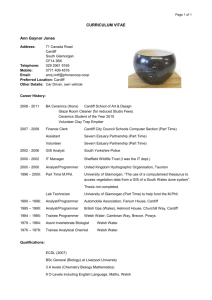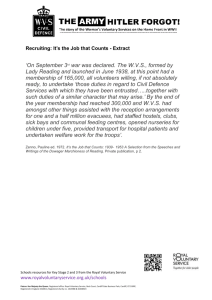Document 12006567
advertisement
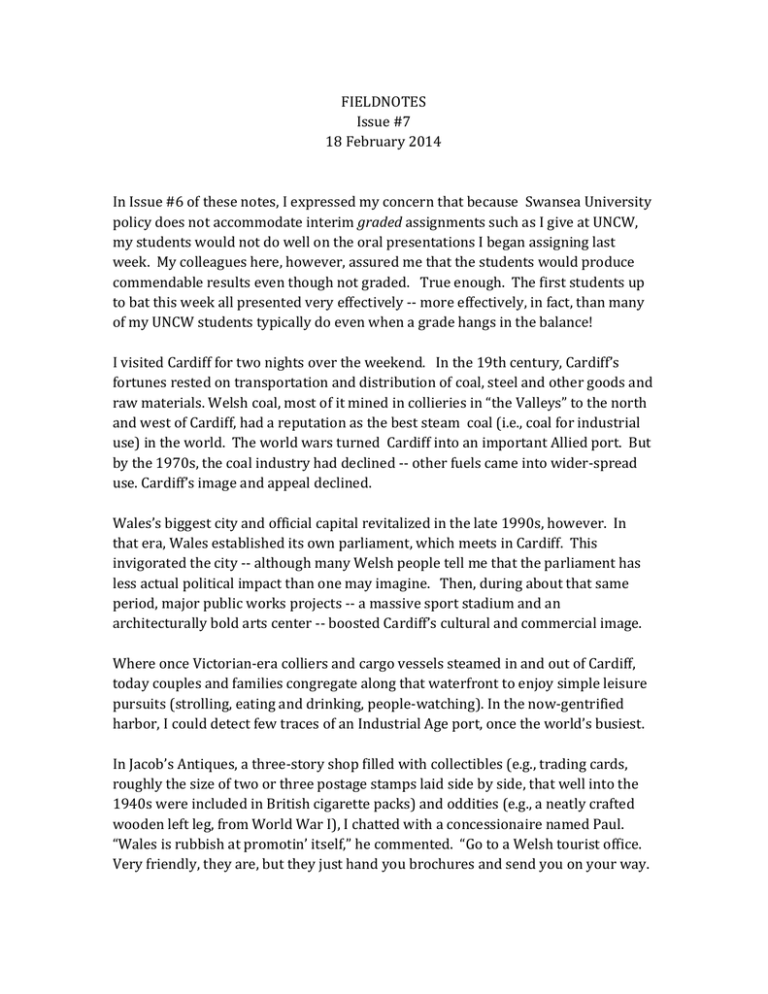
FIELDNOTES Issue #7 18 February 2014 In Issue #6 of these notes, I expressed my concern that because Swansea University policy does not accommodate interim graded assignments such as I give at UNCW, my students would not do well on the oral presentations I began assigning last week. My colleagues here, however, assured me that the students would produce commendable results even though not graded. True enough. The first students up to bat this week all presented very effectively -­‐-­‐ more effectively, in fact, than many of my UNCW students typically do even when a grade hangs in the balance! I visited Cardiff for two nights over the weekend. In the 19th century, Cardiff’s fortunes rested on transportation and distribution of coal, steel and other goods and raw materials. Welsh coal, most of it mined in collieries in “the Valleys” to the north and west of Cardiff, had a reputation as the best steam coal (i.e., coal for industrial use) in the world. The world wars turned Cardiff into an important Allied port. But by the 1970s, the coal industry had declined -­‐-­‐ other fuels came into wider-­‐spread use. Cardiff’s image and appeal declined. Wales’s biggest city and official capital revitalized in the late 1990s, however. In that era, Wales established its own parliament, which meets in Cardiff. This invigorated the city -­‐-­‐ although many Welsh people tell me that the parliament has less actual political impact than one may imagine. Then, during about that same period, major public works projects -­‐-­‐ a massive sport stadium and an architecturally bold arts center -­‐-­‐ boosted Cardiff’s cultural and commercial image. Where once Victorian-­‐era colliers and cargo vessels steamed in and out of Cardiff, today couples and families congregate along that waterfront to enjoy simple leisure pursuits (strolling, eating and drinking, people-­‐watching). In the now-­‐gentrified harbor, I could detect few traces of an Industrial Age port, once the world’s busiest. In Jacob’s Antiques, a three-­‐story shop filled with collectibles (e.g., trading cards, roughly the size of two or three postage stamps laid side by side, that well into the 1940s were included in British cigarette packs) and oddities (e.g., a neatly crafted wooden left leg, from World War I), I chatted with a concessionaire named Paul. “Wales is rubbish at promotin’ itself,” he commented. “Go to a Welsh tourist office. Very friendly, they are, but they just hand you brochures and send you on your way. Where was the first railroad? Wales. You’ve heard of Mount Everest? Named after a Welshman. But no one here knows how to capitalize on that sort of thing.” Paul continued, “One Welsh lad come to America well over two hundred years ago. He wrote a letter to his relations in Wales: ‘The Indians call this place Ten-­‐nes-­‐see. I have begun distilling whiskey, exactly as Grandmother used to.’” Paul paused for effect. “This boyo stayed in Tennessee. His family continued distilling whiskey. You know what family it was?” I didn’t. “Ever heard of Jack Daniel?” On Sunday night I watched the BBC telecast of the U.K.’s annual BAFTA Awards -­‐-­‐ Britain’s equivalents of the Oscars. BAFTA -­‐-­‐ British Academy of Film and Television Arts -­‐-­‐ has established several criteria by which a film may be considered “British.” Is the director British? is a certain percentage of the creative team British? did a British organization release the film? did a British organization fund the production? did the filmmakers shoot in Britain? -­‐-­‐ answer such questions with “Yes” and you have yourself a “British” film. I have noticed that in the multiplexes of Swansea and Cardiff, nearly all of the films appear to be “American” films. But no! Twelve Years as a Slave, for example, qualifies as a British film … who knew? Imagine that I say to you, in Wilmington, “Here is a free ticket tonight to a British movie. It has great special effects and A-­‐list stars.” You might reply, “Thanks, but, tonight I have to, um, pick my grandmother up at the airport. And then I have to shampoo my hair.” But if instead I said, “Here’s a free ticket for tonight to Gravity,” which indeed has great SFX and top (U.S. American) stars -­‐-­‐ and, by BAFTA’s criteria, happens to be a British film -­‐-­‐ you’d go. The BAFTAcast had much less glitz and more dignity than Hollywood’s annual Oscarcast. It also did not last as long (several lower-­‐profile awards given on Oscar Night were distributed by BAFTA at an untelevised event earlier this month). The BAFTA show had fewer production numbers. The host (Stephen Frye, who has served in this capacity several times in recent years) kept the proceedings moving smoothly, confidently and amiably. Two thumbs up, in my opinion, on all those differences from Oscar’s limelight night. Most importantly -­‐-­‐ to me and, I expect, to Frank Trimble, my friend and colleague with whom I watch the U.S. Oscarcast most years, who teaches advanced public speaking courses (among others) in the UNCW Communication Studies Dept., and happens to be one of the best two or three speakers in creation -­‐-­‐ most of the winners gave excellent acceptance speeches. No inebriated nattering; no incoherent maundering, suggesting the winner had no idea whatsoever that he or she might possibly have to deliver a brief speech; no fumbling in a pocket for a crumpled manuscript of a prepared speech that the winner then reads rapidly in a monotone; no one merely uttering a tiresome list of people to thank and then leaving the stage; no Julia-­‐Roberts-­‐style, “My-­‐time’s-­‐up-­‐but-­‐the-­‐heck-­‐with-­‐that-­‐I’m-­‐gonna-­‐keep-­‐ talking” defiance of the time limit per speaker. Most of the speeches came across as sincere, cogent, witty at times, articulate and respectful of time limits -­‐-­‐ exactly what one expects from professionals in a business that revolves markedly around spoken language and well-­‐honed facility in the delivery of it. I think it was football coach Lou Holtz who, disdainful of players who engage in zany antics around the goalposts after a touchdown, one said, “When you’re in the end zone, act like you’ve been there before in your life.” Similarly, film luminaries ought to act like they know how to design and present brief, heartfelt speeches. BAFTA acknowledged Helen Mirren with a special award in appreciation of her artistic contributions throughout a long career. To begin her speech, she asked, “Who in this room was inspired to work in this field by a teacher?” About 85% of the attendees raised their hands. This launched her gracious acknowledgment of what teachers do -­‐-­‐ no complaints from me! She concluded by quoting Puck’s short farewell monologue from Midsummer Night’s Dream. Again, no complaints here. On the other hand, a segment honoring film industry personnel who had passed away in the preceding twelve months was somewhat pedestrian, less poignant than the equivalent segment at the Oscar show -­‐-­‐ and far less touching than the memorial tributes broadcast late in December every year on Turner Classic Movies. British viewers with Twitter accounts went crazy when the BAFTA tribute ended with no mention of James Gandolfini. The late actor made a splash on U.S. cable TV, of course. But before and during the Sopranos years, he had an estimable career on the big screen as a character actor and occasionally a male lead. Even the recently deceased Paul Walker showed up in BAFTA’s tribute. Yet Gandolfini surely eclipsed Walker in status and accomplishment in the film world. Most of the people honored in BAFTA’s memorial segment likely will appear in the Oscar show’s tribute later in February. Gandolfini will surely be in it. If he isn’t, Paulie Walnuts is gonna wanna see someone for a coupla minutes.

